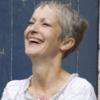The sleep team at ResMed UK have celebrated their move to Wigmore Street. Cutting the ribbon is UK Clinical Services Manager, Angie Drennan, with fellow practitioners Thomas Holly and Samantha Wells.
 Diagnosing obstructive sleep apnoea (OSA)
Diagnosing obstructive sleep apnoea (OSA)
There are several different types of sleep apnoea and they have different causes. Fortunately, they can all be treated. In broad terms the key phases of sleep apnoea are:
1. Air stops flowing to your lungs for ten seconds or longer, meaning you stop breathing.
2. Your brain sends a signal to you to wake up and to take a breath. You take a breath and fall back to sleep.
3. Cycle repeats - these apnoea events can occur hundreds of times a night and many people (other than their partners!) simply don’t know it is happening.
Getting a good night's sleep is absolutely fundamental to both our physical and mental health.
How do you diagnose OSA?
A sleep test can be done in a sleep test clinic or using a remote monitor in the comfort of your home. The home sleep test (HST) involves the fitting of diagnostic sensors . Before a home sleep study night, a sleep clinician will show you how to apply the sensors and monitors, and how to use the recording device. You follow your normal routine, prepare for sleep, attach everything as you’ve been shown and start the recording. In the morning, you’ll remove everything as previously demonstrated and return the recording device to the sleep lab or hospital.
Does snoring mean OSA?
It is worth noting that snoring is far more common than OSA. There are important diagnostic differences. Even though most patients who have OSA snore, most patients who snore do not have OSA. Sleep apnea testing is the only way to distinguish snoring in association with OSA from primary snoring.
Association between gastroesophageal reflux disease (GERD) and OSA
Gastroesophageal reflux disease (GERD) can mimic OSA by producing a choking sensation and dyspnea at night. The fact that GERD may improve with positive airway pressure therapy, sometimes confuses the separate diagnoses.
When a diagnosis for OSA may be needed
OSA should be suspected if there is excessive daytime sleepiness, snoring, and choking or gasping during sleep. This is especially the case when combined with the key risk factors, which include:
- obesity
- male (women's sleep are often affected by other conditions)
- advanced age
- early morning headaches
- high blood pressure
- complications (eg, neuropsychiatric symptoms)
The time of a woman’s life when her ovaries stop releasing an egg (ovum) on a monthly cycle, and her periods cease
Full medical glossary











